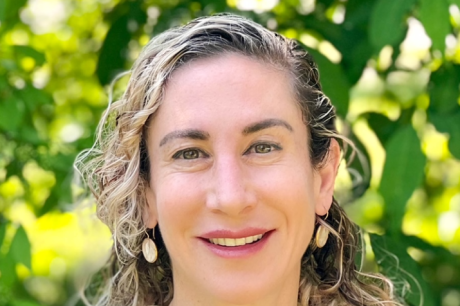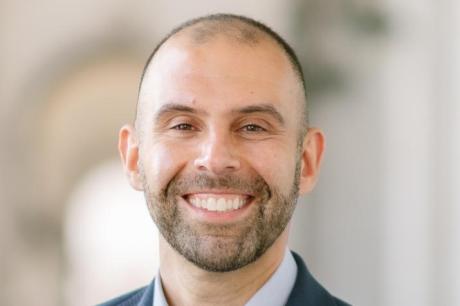Published April 28, 2008, last updated on March 4, 2013

Tachi Yamada spends a lot of his time encouraging people to think differently about global health solutions.
“We have a problem with how we think about new ideas,” he told Duke faculty and students in Reynolds auditorium during the Chancellor’s Lecture on April 28. “We have a tendency to exist within paradigms in which we feel comfortable. We need to shift our paradigm. It is like heating water. Everyone used to think that the only way to boil water was to have a heat source and put water on top of it. But then someone came up with the idea of colliding water molecules together, and we now we have microwaves – they have revolutionized how we think of heating water. We need to create an ecosystem that promotes new ideas.”
Yamada, who is the president of the Global Health Program at the Bill & Melinda Gates Foundation, went on to share his thoughts on some of the ways we need to think in order to address the massive global health problems we face.
“Some people think we should stick to setting realizable goals, rather than lofty, hard to reach goals. But look at malaria,” he said. He described how, Zambia, a poor country, has used a combination of existing tools such as insecticides, bednets, treatment of pregnant women, and medications to control malaria and drastically reduce the burden of malaria in the country. “But in Sri Lanka, they reduced the incidence of malaria to 19 cases, and then stopped using DDT. Now malaria has come back and now they are close to three-quarters of a million cases each year. You can’t simply control malaria because it will eventually come back. I believe we must eradicate it. It is a lofty goal, but we have to bite the bullet and take on this challenging goal.”
Yamada also challenged the notion that global health problems can be solved by taking the results from small, controlled experiments and scaling them up. “No two environments are the same. Solutions must be customized and tailored to the population—to the patients.”
In his soft-spoken voice, he addressed the notion that marketing is a “dirty word” in the realm of global health. “We assume that if a product is good, people will want it. But nothing could be further from the truth. The pharmaceutical companies have learned that you must sell the patients the benefits of the medications, no matter how good the product is. Otherwise, the medicines will not be taken up by the population.”
As an example of innovative marketing, he described the use of conditional cash transfers, where people in countries such as Mexico and India have been paid as an incentive to get appropriate care. “The results are impressive. You don’t have to have complex infrastructures to deliver the care. All you have to have is real incentives for people to seek and receive the right kinds of care,” he said.
At the heart of his talk was his description of the Grand Challenges for Global Health – the Gates Foundation effort to spur innovation in the discovery of new tools and treatments to tackle global health problems that currently do not have solutions – such as HIV/AIDS.
“New ideas come from all over, not just the developed world,” he said. “But they are often fleeting. They need to be nurtured. It doesn’t take a lot of money to look into them for a short time. We need to not kill them off by endless processes such as peer review,” he said. “After all, true innovation has no peers.”
The Grand Challenges program offers the opportunity for people around the world to submit a two-page description of their innovation and a way to test it. The submissions are reviewed by “a team of very smart people, but not necessarily experts in the field.” The people with ideas deemed most likely to succeed are offered $100,000 to begin work on their project.
“We know that most [of the ideas] will fail. But if one or two out of 1,000 pan out, we will be then put millions behind that idea to move it forward,” said Yamada.
The first round of applications has focused on HIV/AIDS prevention and treatment, novel approaches to circumvent antibiotic resistance, and ideas about latent tuberculosis. “The exciting thing is that we’ve received hundreds of applications already, and more than 25 percent have come from the developing world,” he said. “Many of these people could never apply for an NIH grant. But they can put together a solid two-page submission.”
Yamada closed his lecture by expressing a sense of optimism that progress is possible.
In an example from his own life, he told of working for GlaxoSmithKline when the company sued South Africa over patent infringement for AIDS medicines. “It was a crisis in my life. I wondered what I was doing working for a company like that. Well, it was a bad mistake, but one of the things that it resolved in my mind was that we were going to make medicines for people in the developing world.” He started a laboratory in Spain that focused on TB and malaria. GSK agreed to support up to 50 people to work and allow them to find additional funding from other sources. “The group is now up to 120, and accounts for almost half of the new drugs for malaria,” he said with pride.
The increased attention to global health, the more robust pipeline of drugs for the developing world, and the fact that burden of many diseases, such as polio, river blindness and other scourges have been diminished, all nurture Yamada’s sense of optimism.
“But there is still a long road ahead,” he cautioned. “The Gates Foundation will be spending $10 billion over the next 5 years, but the World Bank estimates that 25-70 billion is needed for global health investments. We need more people, more resources, more ideas, and organizations like Duke can be major contributors. With intelligence, with resources, with knowledge, with the desire to save lives, I believe we can do better.”
For more information about the Bill & Melinda Gates Grand Challenges program, visit http://www.gcgh.org/explorations/Pages/Introduction.aspx


